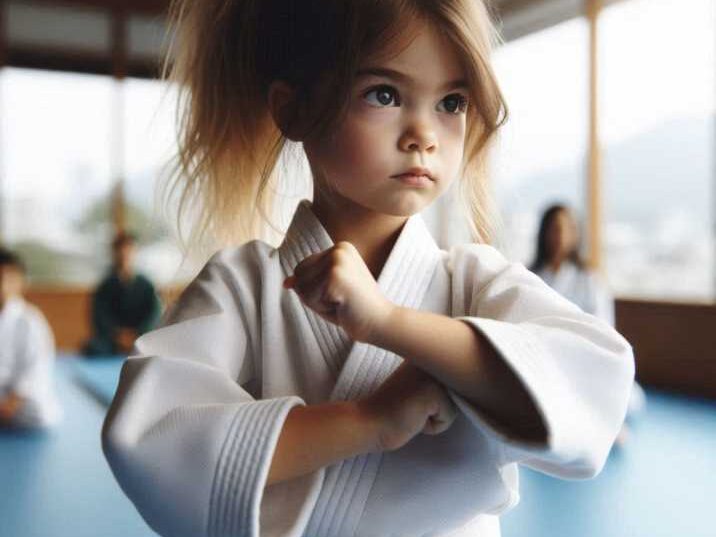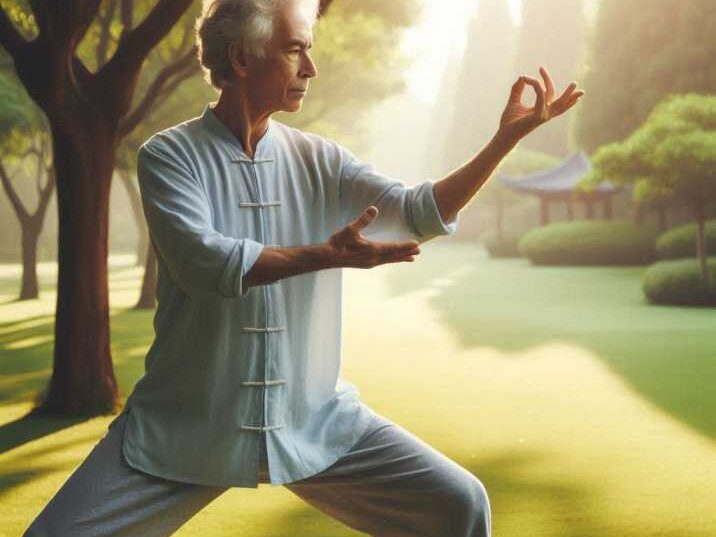Martial arts isn’t just about kicks, punches, or learning how to defend yourself. It’s also a powerful tool for improving mental well-being. Whether you’re a child looking to do better in school or an adult wanting to handle stress better, the psychological benefits of martial arts are undeniable. Let’s dive into how this ancient practice can boost your mental health!
Introduction: A Path to Mental Strength
Table of Contents
When people think of martial arts, they often picture action-packed fights or self-defense techniques. But martial arts offers more than just physical benefits—it builds a stronger mind! Through rigorous practice, you learn discipline, patience, and mental resilience. These skills can help you excel in other areas of life, like school, work, and personal relationships.

1. Improved Focus: Sharpening the Mind
The Power of Concentration
Martial arts demands intense mental focus. Whether it’s blocking an incoming punch, executing a precise kick, or learning a complex technique, students must give their full attention to every movement. This requirement for concentration strengthens the mind’s ability to focus over time.
For kids, this improvement in attention spans often leads to better results in school. By learning how to stay present during martial arts training, they also become better at staying attentive during classroom lessons or while doing homework. Adults can also benefit from this skill, as heightened focus can improve productivity at work and help manage daily tasks more efficiently.
2. Building Confidence Through Achievement
Setting Goals and Crushing Them
One of the greatest aspects of martial arts is its belt ranking system, which allows students to see tangible progress as they train. Earning a new belt isn’t just a symbol of skill but a reward for dedication, effort, and persistence. This builds self-confidence, as students realize they can achieve their goals through hard work.
For shy individuals, stepping onto the mat and practising in front of peers can be transformative. The confidence gained from learning techniques, sparring, and achieving personal milestones often spills over into other areas of life, like public speaking or social interactions. Over time, students become more outgoing and self-assured.
3. Stress Relief: Letting Go of Tension
Kicking Away Stress
Martial arts training provides an excellent outlet for stress relief. Physical exercise boosts the production of endorphins, chemicals in the brain that make you feel happier and more relaxed. This natural mood booster can combat feelings of anxiety and even mild depression.
The repetitive movements involved in martial arts, such as throwing punches or practising forms (katas), have a calming, meditative effect. These movements allow practitioners to release pent-up energy and let go of negative emotions, leaving them feeling lighter and more at ease.
4. Discipline and Self-Control: Life Lessons Learned on the Mat
Stick to the Routine
Discipline is a core principle of martial arts training. Students learn to:
- Follow instructions: Respecting the guidance of their sensei (teacher).
- Stick to practice schedules: Building consistency in their training.
- Control their actions: Practicing techniques with precision and patience.
This focus on discipline and self-control doesn’t stop at the dojo. It carries over into everyday life, helping students make better decisions, manage their time effectively, and resist impulsive behaviours. Whether it’s completing chores or meeting deadlines, the discipline learned in martial arts becomes a lifelong skill.
5. Emotional Control: Staying Calm Under Pressure
Mastering Emotions
Martial arts training teaches students how to handle high-pressure situations with calmness and clarity. Whether facing an opponent in sparring or learning a challenging move, they’re constantly reminded to stay composed and think strategically.
This training helps students manage emotions such as anger, frustration, or fear. For kids, this means fewer tantrums and better responses to challenges. For adults, it translates into greater emotional resilience, helping them handle stress at work or resolve conflicts in relationships.
Over time, martial arts practitioners develop the emotional control needed to navigate life’s ups and downs with a cool head and a positive mindset.
6. Enhancing Social Skills
Martial arts training is not just about individual growth—it’s also a social experience. Whether you’re participating in group activities, sparring with a partner, or practising team drills, the social environment in martial arts classes provides valuable lessons in teamwork, communication, and relationship-building.
Teamwork and Communication
Group Activities and Drills
Martial arts classes often require students to work together in pairs or groups. For example:
- Sparring sessions teach students to engage respectfully and safely while anticipating and reacting to their partner’s movements.
- Team drills, such as practising forms or sequences together, require coordination and mutual support to ensure everyone learns effectively.
These collaborative tasks promote teamwork by encouraging individuals to listen, follow instructions, and offer constructive feedback. Communication becomes essential for success, whether it’s clarifying techniques, helping a teammate improve, or strategizing during drills.
Respectful Interaction
Martial arts also instil respect for others. Students bow to instructors and training partners as a sign of mutual appreciation. This fosters a positive, respectful environment where students learn to value different perspectives and abilities, which translates into better communication skills in everyday life.
Building Friendships and Reducing Loneliness
Forming Bonds
Martial arts classes create a sense of community. Training with the same group of people over time helps students build connections and develop friendships. Shared goals, challenges, and successes deepen these bonds, creating a supportive network both inside and outside the dojo.
Boosting Confidence Through Social Connections
For kids, this can be especially impactful. Martial arts provides a safe, structured environment where they can make friends and interact with peers. These friendships often lead to greater self-confidence, especially for shy or introverted individuals.
For adults, participating in a martial arts class can reduce feelings of isolation, offering a space to connect with like-minded individuals who share similar interests. The sense of belonging in a martial arts community can be a powerful antidote to loneliness.
7. Practicing Mindfulness: Living in the Moment
One of the most powerful psychological benefits of martial arts is its ability to teach mindfulness. Mindfulness means being fully present in the moment, focusing on what you’re doing without worrying about the past or future. In martial arts, this concept is woven into every movement, making it a unique form of “moving meditation.”

Moving Meditation
Focused Attention Through Technique
Martial arts techniques, such as striking, blocking, or flowing movements, demand complete concentration. For example, when practising a karate punch or a spinning kick, you must focus on your stance, breathing, and timing. This prevents your mind from wandering and brings your full attention to the present task.
By repeatedly practising these movements, your brain learns to tune out distractions. Over time, this helps improve your ability to focus, not just during training but also in daily life.
Mindfulness Reduces Anxiety
This state of focused awareness helps calm the mind. When you’re fully engaged in martial arts practice, you let go of racing thoughts or worries. This reduction in mental clutter can significantly decrease anxiety levels, leaving you feeling more peaceful after a session.
Many practitioners describe their martial arts training as therapeutic because it allows them to take a break from life’s stressors and focus solely on their movements and breathing.
Tai Chi: The Ultimate in Mindful Movements
While all martial arts promote mindfulness, Tai Chi is particularly renowned for its meditative qualities. Its slow, flowing movements are often described as a “dance of balance.” Each movement is deliberate and performed with deep focus, making it ideal for those seeking stress relief and mental clarity.
Practicing Tai Chi regularly can:
Enhance body awareness, as you become more in tune with your physical and mental state.
Promote relaxation by slowing down the mind and body.
Improve emotional balance, reducing feelings of stress or frustration.
Table of Information: Key Psychological Benefits of Martial Arts
| Benefit | Description |
|---|---|
| Improved Focus | Training sharpens concentration, which helps in academics and daily life. |
| Increased Confidence | Achieving milestones in martial arts builds self-esteem. |
| Stress Relief | Physical activity reduces anxiety and improves mood. |
| Emotional Control | Martial arts teaches how to manage emotions under pressure. |
| Discipline and Self-Control | Regular practice instills discipline that carries over to other areas of life. |
| Social Skills | Training with others fosters communication, teamwork, and empathy. |
| Mindfulness | Movements in martial arts promote present-moment awareness and mental clarity. |
Conclusion: A Stronger Mind Through Martial Arts
Martial arts is more than a physical activity—it’s a journey to mental strength. From improved focus to better emotional control, martial arts offers countless psychological benefits for kids and adults. Whether you’re looking to reduce stress, boost confidence, or sharpen your mind, martial arts has something for everyone.
Start your journey today and unlock the mental power within!
FAQs
1. How does martial arts improve mental health?
Martial arts reduce stress, build confidence, and improve focus, making them great for mental well-being.
2. Can kids benefit from martial arts training?
Yes, kids gain discipline, confidence, and better focus through martial arts.
3. What martial arts is best for mindfulness?
Tai Chi is excellent for mindfulness, as its movements are slow and meditative.
4. Does martial arts help with anxiety?
Yes, physical activity in martial arts releases endorphins that reduce anxiety and improve mood.
5. Is martial arts good for social skills?
Yes, practising with others enhances teamwork, communication, and empathy.


